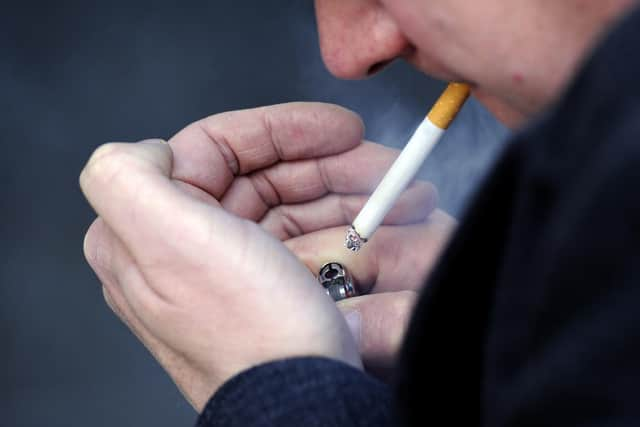UK smoking ban: What does the smoking ban mean for Scotland? When does it start? Who voted against the ban?
Rishi Sunak’s proposal to ban young people from ever being able to legally smoke tobacco has cleared its first Commons hurdle, despite a significant number of of Conservative MPs voting against the legislation.
MPs voted 383 to 67 on Tuesday night – a majority of 316 – to give the Tobacco and Vapes Bill a second reading, but it won’t come into force until it has passed a third reading.
Advertisement
Hide AdAdvertisement
Hide AdUnder the new law, each year the legal age for cigarette sales – currently 18 – will increase by one year. This means that people born in 2009 or after will never be able to legally buy cigarettes. The law will not affect those who are allowed to buy cigarettes now.


But what does it mean for Scotland and who voted against it?
What does it mean for Scotland?
Smoking in Scotland is already prohibited in public transportation, around hospital buildings and in virtually all indoor public places and workplaces. While the smoking ban was passed in Westminster, the expectation is it will also apply to Scotland.
The Prime Minister has expressed a desire to work with the Scottish Government, as well as the governments of Wales and Northern Ireland, to introduce the legislation across the UK. Given the Scottish Government is consulting on its own measures to tackle smoking, it is likely the policy will go UK-wide.
Speaking on Wednesday, SNP MP Kirsten Oswald said: “Having long campaigned on this issue and after a consultation showing overwhelming support for action in Scotland, I am proud that SNP MPs supported the Bill that will set us on the path to deliver a smoke-free Scotland and tackle the scourge of disposable vapes and the impact they have on children’s health.
“The forthcoming ban on disposable vapes is welcome, but it remains a disappointment that we will have to wait until next year for the ban to be implemented, and until 2026 for a vape tax to be introduced. Scotland shouldn't have to wait for Westminster to act.”
When does the ban start?
The government aims to have the new system in force by 2027, but MPs need to vote for the Bill at a third reading, making it law.
It follows similar approaches in other countries such as New Zealand and Mexico, with the latter having smoking bans at beaches, parks and, in some cases, private homes.
Advertisement
Hide AdAdvertisement
Hide AdPortugal also aims to have a "smoke-free generation" by 2040, and wants to pass a law that would stop bars, cafes and petrol stations from selling tobacco products. Canada is hoping to reduce tobacco use to less than 5 per cent by 2035.
Which Tories voted against it?
Conservative MPs were given a free vote on the Bill, meaning those who voted against the government’s position would not face punishment. This meant an array of serving ministers voted against the legislation, including many regarded as possible leadership candidates for after the general election.
Business secretary Kemi Badenoch revealed she would vote to reject the Bill, and explained her reasons on X. She said: “The principle of equality under the law is a fundamental one. It underpins many of my personal beliefs. We should not treat legally competent adults differently in this way, where people born a day apart will have permanently different rights.”
Another potential contender to run for the Tory leadership, former immigration minister Robert Jenrick, also came out against the policy.
He tweeted: “I believe in personal freedom. Let’s educate more and ban less. I also believe in the principle of equality under the law. A phased ban of smoking would be an affront to that. I will therefore vote against the Tobacco and Vapes Bill.”
They were joined by Foreign Office minister Anne-Marie Trevelyan, who said she hoped MPs could “make amendments, which will make it law which will be more likely to actually deter young smokers without removing freedom of choice for adults”.
Former prime minister Liz Truss also opposed the Bill, saying it was the “technocratic establishment” aiming to “limit people’s freedom”, adding it was a “virtue-signalling piece of legislation”.
In a warning to Tory colleagues, Ms Truss said she was “disappointed” that a Conservative government was bringing forward a smoking ban.
Advertisement
Hide AdAdvertisement
Hide AdShe claimed there were enough “finger-wagging, nannying control freaks” on the opposition benches willing to support the proposals, urging Conservatives to “stand by our principles and our ideals”.
Former Conservative Party chairman Brendan Clarke-Smith also opposed the legislation, suggesting the proposal could lead to further health-related bans.
He said: “What next? A ban on alcohol? A ban on takeaways? I would declare an interest in both of those. Both of these are bad for us when they are not done responsibly. But we are adults, these are our choices, these are not the state’s choice.”
The division list showed 57 Conservative MPs voted against giving the Tobacco and Vapes Bill at a second reading, while 178 voted to support the legislation.
Other serving ministers voting against included Cabinet Office minister Alex Burghart, Northern Ireland minister Steve Baker, culture minister Julia Lopez and communities minister Lee Rowley.
Penny Mordaunt, the Leader of the House of Commons, was among 106 Tory MPs listed as having “no vote recorded”. Not all those listed in this way will have abstained, as some will have received permission to miss the vote.
Other Conservative former ministers supported the plans, with ex-health secretary Sir Sajid Javid criticising colleagues for “choosing to stand up for big tobacco against the interest of their constituents”.
Steve Brine, Conservative chairman of the health affairs committee, suggested small-state Tories should back the measures to eliminate costs for the taxpayer.
Comments
Want to join the conversation? Please or to comment on this article.
